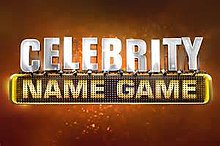Main game
The game involves two teams, each consisting of two contestants who are related or know each other. They are joined by two guest celebrities who assist the teams for all but the third segment of the show, attempting to identify the names of popular culture subjects like celebrities, fictional characters, place names, or film and television titles. [3]
In the first two rounds, each team is assigned one of the celebrities, who then will switch teams for the second round. Each of the three-member teams are presented with a category containing ten names. One person will give clues, trying to get the other two to guess the names. Successful guesses earn money. An illegal clue (saying the name or part of the name, spelling the name, or rhyming the name) voids that name. Each turn lasts for 45 seconds. In the first round, one team is chosen to play first, and chooses one of two categories presented, leaving the second team to play the remaining category. In the second round, the second team plays first and chooses the first category.
In round one, the celebrity gives the clues while turning back and forth to alternately face each contestant, and each correct answer is worth $100, up to $1,000 total. In round two, one of the two contestants gives clues while alternately facing either the remaining partner or the assigned celebrity, and each answer is worth $200, up to $2,000 total.
In the third round, the contestants go head to head while Denyer gives the clues to names under a specific category. The contestants buzz in to make a guess. If neither contestant buzzes in after a while, Denyer can start giving out clues that are normally illegal, all the way up to simply saying the name. A right answer earns money for the team that answered, but a wrong answer grants the money to the opponent. The first answer is worth $100 and each successive answer increases in value by $100. Winnings in this round are added to the money accumulated in the first two rounds, and whichever team reaches $3,000 or more first is the winner, keeps the cash, and goes on to the bonus round to play for the prize of $10,000. If no team reaches $3,000 before time is called, the team in the lead at the end of the round wins the game. If the game ends in a tie, one final name is given; a team who buzzes in with a correct answer wins the game, but a wrong answer results in an automatic loss.
Bonus round
In the bonus round, there is no particular category. The names of people, characters, places, shows or things are hidden behind ten numbered squares. The contestants take turns giving the clues to both celebrities. One contestant is placed in a soundproof booth while the other gives clues. The current giver starts describing when a name or picture is exposed. If the celebrity receivers get it right, the name stays revealed. Passing on a name re-conceals it. This round lasts for a total of 75 seconds, the first contestant has 45 seconds, and the second has 30 seconds. If the first clue giver provides an illegal clue to a name, that name is replaced by a different one for the second clue giver. Any illegal clue by the second clue giver, however, ends the round immediately. Getting all ten increases the team's total winnings to $10,000. If the first contestant correctly guesses all ten names within 45 seconds or less, the second portion of the round is not played. Otherwise, the team takes home only the amount they had earned by the end of Round 3.
